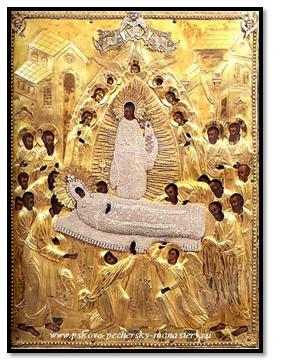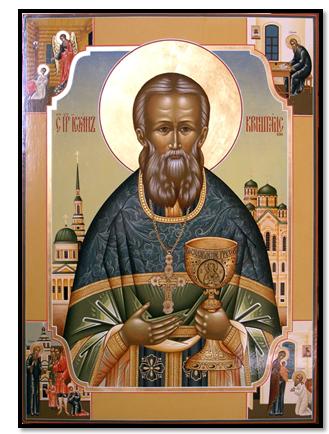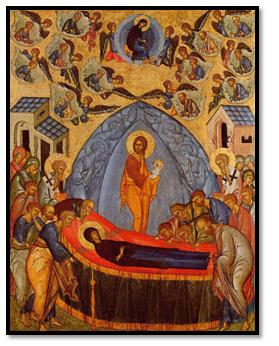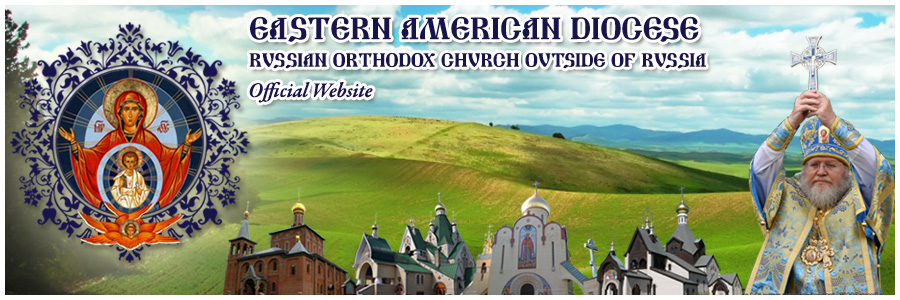Русская
Версия
 The feast of
the Dormition is the last great feast in the Church calendar year. It is
preceded by a two-week fast.
The feast of
the Dormition is the last great feast in the Church calendar year. It is
preceded by a two-week fast.
The glorious
lot of the ever-blessed Virgin in the work of God’s salvation of the
world made all Her life wonderful and exemplary. After the Crucifixion
of Christ, the Mother of God was taken to live in the house of Her
adopted son, the Apostle John. Tradition notes than even after the
descent of the Holy Spirit on the apostles, the Mother of God remained
in Jerusalem, visiting those places where the Saviour of the world
preached, suffered and died. She did not want to leave the country that
was dear and holy to Her. When king Herod Agrippa began to persecute the
Church, both the pagans and the Jews, indignant of the respect that the
Mother of God was receiving from the Christians, wanted to kill Her. It
was during this time that She traveled with Apostle John to Ephesus.
Church tradition has this also as the time of Her visit to Cyprus to
Bishop Lazarus, who had been raised from the dead after four days, and
to Mount Athos. When the persecution ended, the Mother of God returned
to Apostle John’s house at Zion in Jerusalem.
Once, when
She went to the Mount of Olives to pray, Archangel Gabriel appeared and
spoke of Her approaching departure from this world. Upon returning home,
She told Apostle John all that the Archangel had said to Her and started
preparing Herself for Her final day on earth. Friends and relatives
gathered, and eleven of the apostles were miraculously transported from
various parts of the world to Her deathbed. They were all amazed to see
each other there. When Apostle John explained that the Mother of God
would soon be departing this world, they understood why God had brought
them together and became sad. But She comforted them, saying: “Do not
cry and darken My happiness with your sadness. I am going to My Son and
your God, and you will bury My body and return each to your work.” As
the time of Her death neared, the room shone with a divine light, the
roof disappeared, and a wondrous sight appeared before all: the Lord
Jesus Christ descended from heaven surrounded by many angels. All looked
upon this wondrous sight with awe and reverence, and when they
approached Her bed, the holy body of the Mother of God shone radiantly,
and a fragrance of incense pervaded the room.
The apostles
carried the body of the Mother of God through the city to Gethsemane, to
be buried at Her request in the tomb of Her family and Joseph. They
buried Her body, closed the tomb with a stone and remained there at the
site in prayer for three days. On the third day Apostle Thomas arrived
and was very saddened that he did not find the Mother of God alive. To
make him feel better, the other apostles rolled away the stone to let
him pay his respects to the body. But on entering the tomb, they found
that the body was not there – only the winding sheet. They returned
home to partake of a communal meal at which they always left a place for
the Resurrected Lord. After the meal, they raised the bread left for
Christ aloft and exclaimed: “Lord, Jesus Christ, help us.” And they
heard a choir of angels, and when they looked up they saw the Holy
Virgin surrounded by angels. She greeted them, saying: “Rejoice, for I
am with you through all the days.” Then the apostles were filled with
joy, and instead of using the usual words, they exclaimed: “Most holy
Mother of God, help us.” And now they understood and believed that
upon the third day after Her dormition, the Mother of God had been
resurrected.
Thus, the
dormition of the Mother of God is not a sad event, but a joyous one. Her
death is but a short sleep, after which follows Her resurrection and
ascension to heaven. From the very beginning, the Church saw in the
Mother of God the One who would pray for all of mankind. She is the
haven of all the mothers in the world. She teaches us how to live in
total faithfulness to the will of God. She, who kept in Her heart the
divine words, is an example of faithfulness, love and service.
Comforting
truths inherent in the Feast of Dormition
 Blessed is
God for having granted us this great day, in which from ancient times
and with triumphant hymns the universal Church accompanies heavenward
into supreme Zion the incorruptible body of the Mother of God together
with Her soul, and allows us to take pleasure in the spiritual fragrance
of Her indescribable holiness and in all the virtues with which She was
endowed by the Holy Spirit and by the Son of God, Who had issued from
Her by taking on human nature! With what tenderness, joy, and piety did
the apostles and all the other elect enjoy the wondrous vision of the
reposing Theotokos’ visage, all shining with heavenly light, and the
indescribable heavenly fragrance of Her God-bearing body, and the
contemplation of the brightest visage of Her Son and God, the Lord Jesus
Christ, Who had come to take His holy Mother’s soul into His hands! O,
this was a celestial vision on earth, never seen before! Even the
heavenly angels were visibly present here together with their King and
Master.
Blessed is
God for having granted us this great day, in which from ancient times
and with triumphant hymns the universal Church accompanies heavenward
into supreme Zion the incorruptible body of the Mother of God together
with Her soul, and allows us to take pleasure in the spiritual fragrance
of Her indescribable holiness and in all the virtues with which She was
endowed by the Holy Spirit and by the Son of God, Who had issued from
Her by taking on human nature! With what tenderness, joy, and piety did
the apostles and all the other elect enjoy the wondrous vision of the
reposing Theotokos’ visage, all shining with heavenly light, and the
indescribable heavenly fragrance of Her God-bearing body, and the
contemplation of the brightest visage of Her Son and God, the Lord Jesus
Christ, Who had come to take His holy Mother’s soul into His hands! O,
this was a celestial vision on earth, never seen before! Even the
heavenly angels were visibly present here together with their King and
Master.
Only three
days did the Most-pure body of the Theotokos, buried by the apostles in
Gethsemane, remain in the tomb, only three days did it stay there, and
afterwards it was resurrected by the Lord and united with Her soul, and
She was taken up together with Her body into heaven. For only three days
was She fated to repose in the sleep of death, just as the Lord Himself
remained in His tomb for three days and afterwards arose to confirm the
universal resurrection of mankind. Death, having been vanquished by the
resurrected Christ, became for the faithful a dormition, a passage, a
step towards immortality and eternal life, provided we die in faith,
repentance, and virtue.
Let us
venerate the Most-glorious Mother of God, higher than the heavens and
purer than sunlight, Who delivered mankind from its curse, i.e. from
God’s damnation. But what exactly is God’s curse? It is the
consequence of God’s righteous wrath upon criminal, sinful mankind, so
ungrateful to its Creator and Benefactor, for which it had been deprived
of God’s mercy, eternally rejected from the face of God, condemned to
the eternal torment of hell or to eternal death with the fallen angels,
the evil spirits. Eve, our foremother, was responsible for this
damnation together with Adam through the sin of disobedience – and
even to this day its consequences continue to overshadow sinners who do
not know God, their Saviour. But the Theotokos, through Her humility,
obedience, meekness, God-like purity, acceptance of the Archangel’s
tidings, and above all through Her wondrous bearing of the Son of God in
Her womb, attracted God’s blessing upon the world by giving birth to
the Saviour of the world and obtaining the benevolence of the Heavenly
Father towards all the faithful. Another consequence of God’s
damnation of mankind was death, but Christ, the Son of God, Who was born
of the Theotokos in flesh, Who suffered and died for the sins of
mankind, took upon Himself our damnation, vanquished our death by His
death, and removed the curse from us by crucifying our sins on the cross
and granting us incorruptibility, resurrection, and immortality.
Such are the
comforting truths which the feast of the Dormition of the Theotokos
brings us: it assures us that Christ the Saviour, born from the
Most-pure Virgin Mary, removed from us the curse of our sins and granted
to all of us resurrection from the dead on the last day of the world. Is
this not comforting for every Christian believer?
And having
such an expectation of a general resurrection from the dead, let us try
throughout our entire life to become worthy of the glorious resurrection
into eternal life by means of constant repentance, battle with our
passions and the temptations of the flesh and the world, and strive for
success in all virtues, in order to eternally enjoy the infinite,
incorruptible, surpassing all understanding, all feeling and all
expectation – the blessings of the Heavenly Kingdom, together with
God, the Mother of God, the holy angels, and all the saints. Amen.
St.
John of Kronstadt
A SECOND
PASCHA
Homily for the Dormition of the Holy Theotokos
 The great and
wondrous summer holiday - the Dormition of the Holy Mother of God
- from olden times has been regarded by Orthodox Christians in the light
of a second Pascha.
The great and
wondrous summer holiday - the Dormition of the Holy Mother of God
- from olden times has been regarded by Orthodox Christians in the light
of a second Pascha.
Pascha itself
- the Holy Resurrection of Christ - was a turning point in the history
of mankind. With His resurrection the Lord Jesus Christ opened for us
the gates of paradise, the gates of that place of bliss which was
originally intended for man - the crown of all creation, and which
became closed to us because of the sin of pride and disobedience to God
on the part of our forebears.
But centuries
passed, and God Himself came down to earth, became incarnate in the form
of man, and once again opened to us the gates of paradise, having
manifested - instead of pride - the greatest humility, instead of
disobedience - complete obedience even unto death on the cross, and
instead of sin He - the most pure and absolutely sinless - took upon
Himself the burden of all the sins of the world.
With these
three qualities - humbleness, obedience and purity of nature - the Lord
showed us the highest example of what man can be like, of what he should
be like, and of what the Creator intended him to be.
However, we
may well think, dear brethren, that only God incarnate, the Lord Jesus
Christ, could be such an ideal man, while a mere mortal could never
attain such perfection. But to show us the error of such thinking, we
have before us the Mother of God, Who is the highest example of the
attainment of such perfection, and Who teaches us with Her entire life
and Her dormition that man can attain perfection precisely by means of
these three qualities - humbleness, obedience to the will of God, and
moral purity.
The Holy
Virgin was so humble, that she wished to be even the lowest servant of
the maid who would become the Mother of God. The Holy Virgin was so
humble, that having Herself become the Mother of God, She did not become
haughty, but modestly performed Her great service.
The Holy
Virgin was so obedient to the will of God, that having heard from the
Archangel concerning Her forthcoming service, so extraordinary and
unknown to any mortal, She meekly replied: “Behold the handmaiden of
the Lord.” The Holy Virgin was so obedient to the will of God, that
having heard from the elder Simeon of the future painful torment to
which Her heart would be subjected, She humbly accepted Her share in the
sufferings on the cross of Her Son and God.
Concerning
the extraordinary purity of the Holy Virgin - we are presented with
proof of it from Her very birth. How pure She must have been if the high
priest led Her, a mere three-year-old child, and a female at that, into
the holiest of holies!
In the
prayers before communion the Church warns us to beware of partaking of
the Holy Mysteries while being in a state of uncleanliness, in order not
to burn ourselves, for these particles of Divinity are fiery. How pure
must have been the Holy Virgin, if She contained God Himself in Her womb
and was not burned!
The Gospel
tells us that nothing unclean will enter the Heavenly Realm. How pure
must have been the Holy Virgin, if She not only entered the Kingdom of
Heaven, but having passed through the gates of death like all mortals,
She was taken up into heaven together with Her body and placed right
next to the Throne of the triunal God Himself!
In the
Dormition of the Mother of God, it is these three qualities of hers
which are commemorated - humbleness, obedience and purity, - which have
elevated Her, a mere mortal, above all earthly creatures and above the
entire heavenly host, which have made Her more honorable than the
cherubim and more glorious beyond compare than the seraphim, which have
made Her the Queen of heaven and earth.
Let us try,
dear brethren, to emulate the high example of the Mother of God and,
while celebrating Her wondrous holiday, let us remember that even in Her
Dormition She never abandons us. Amen.
Father
Rostislav Sheniloff
Reproduced
from the website of
Holy Transfiguration Church in Baltimore
www.holy-transfiguration.org


